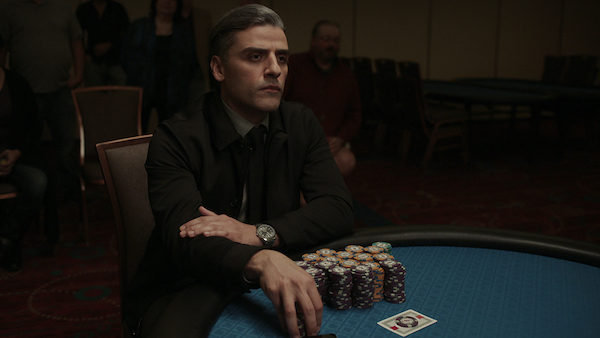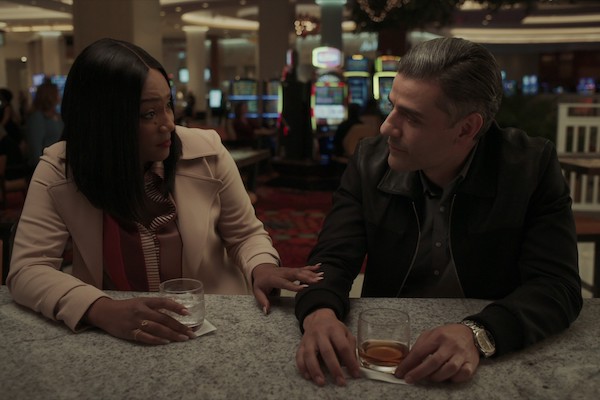Film Review: Interrogating Guilt — Paul Schrader’s “The Card Counter”
By Ezra Haber Glenn
The Card Counter collapses under the weight of director Paul Schrader’s guilt complex.
The Card Counter, directed by Paul Schrader. Screening at AMC Assembly Row, Kendall Square Cinema, AMC Boston Common 19 and other movie houses in New England.

Oscar Isaac in The Card Counter. Photo: Focus Features
Midway through Paul Schrader’s previous work, 2017’s celebrated eco-parable First Reformed, the camera pauses for a meditative shot that hauntingly encapsulates the film’s complex emotional palette. To soothe a festering ulcer, no doubt rooted in his depression about the state of society, the environment, and his own angst, Ethan Hawke’s Reverend Toller spikes his usual four fingers of whiskey with a healthy shot of Pepto-Bismol. The camera hovers over the glass from above: the unnatural cloying pink of the medicine swirls and then coagulates into a disgustingly-beautiful cloud-like nebula amid the earthy-brown hues of the alcohol. It’s pure cinema at its finest: in a single image the film encapsulates its interwoven themes of environmental and spiritual contamination, primal revulsion, and a priest’s admixture of guilt and futile self-destructive penance. It is a reflection of poignant beauty at the moment we realize that something wonderful and rare is slipping away forever.
To readers of Schrader’s highly influential film studies monograph, Transcendental Style in Film: Ozu, Bresson, Dreyer (originally published in 1972, updated in 2018), the cinematic move here will be familiar. It perfectly expresses the director’s moral and aesthetic vision. Strangely, despite providing the key insights to unlock an entire generation of artistic film-makers in the “slow film” tradition — from Terrence Malick to Andrei Tarkovsky — Schrader’s own directorial career has generally fallen short of the films he praises in his analysis. Indeed, after a career spanning more than five decades, prior to First Reformed he was primarily known as the guy who wrote Taxi Driver and Raging Bull for Scorsese — but in 2017, he finally nailed it.
For his follow-up to this impressive late-game touchdown, Schrader’s The Card Counter returns to explore a similar physical — and emotional — landscape, delving into the the director’s fascination with finding value in broken and at times revolting things. At the start we meet William Tell (Oscar Isaac), the titular card counter, a professional gambler who makes his living moving from one small casino to the next, always winning, but being careful to remain just below the radar. Tell learned to count cards while serving a sentence in a military prison — he had plenty of time to perfect the trade. In addition to helping him tilt the odds just slightly in his favor, the skill also helps him feed his inner need for order and control.
Tell is a master of dispassion, combining a perfect, emotionless poker face with a cold and calculating attention to detail. As we become familiar with Tell’s routines, we learn that his need for control and order extends far beyond card games. He keeps a rigid schedule, moving from motel to motel, never staying more than one night, fastidiously wrapping every item in the room with clean white drop-cloths and twine before he pours himself a tight neat drink and writes in his journal in a tight clean script. This is not a healthy soul, but a broken man bordering on mania, an obsessive compulsion clearly developed to lock down some inner demons. Our hero is clinging to strict discipline for fear of…what, we wonder?
The answer comes in the form of nightmares that torment Tell each night, a painful window into his troubled past and his tortured psyche (unfortunately, depicted a bit too obviously, through clunky distorted lenses). Stationed at the infamous Abu Ghraib prison under Major John Gordo (Willem Dafoe), Tell learned, excelled at, and eventually gave himself fully over to, the sadistic techniques of “enhanced interrogation.” When the shit finally hit the fan, Tell and a few others (namely, those, and only those, who were shown in photos leaked to the press) became the fall guys for a system of institutionalized sadism and torture. Tell earned a discharge and a prison sentence. He had enough time to weld a tight lid on the pressure cooker of his boiling mental anguish — Isaac plays this “seething-behind-the-calm-eyes” wordlessly well — but little has been done to address his guilt. Or to resolve the anger and fear he also harbors within — anger at what was done to him and fear over how exceedingly capable he proved at hurting others.
Thus, fixed — or perhaps trapped — in the secure cell of his locked-down routine, Tell might have otherwise continued to check off his remaining days, counting cards, winning small stakes, moving on, holding it together. But the deck holds a pair of cards he wasn’t counting on: a woman (Tiffany Haddish as La Linda), and a kid (Cirk, played by Tye Sheridan).

Tiffany Haddish and Oscar Isaac in a scene from The Card Counter.
La Linda is a backer seeking professional players to add to her well-funded stable, and she sees potential in Tell as a candidate for the gambling big-leagues: the World Series of Poker. Cirk is a sweet, simple, clueless young guy seeking vengeance for his father, another soldier destroyed by what he saw and what he did at Abu Ghraib under the direction of Major Gordo. Between the needs and temptations posed by these perturbations to his steady state, Tell’s wall of control begins to crack. He finds himself drawn into caring again, hoping (with La Linda’s help) to land a big enough pot to make some small amends and set Cirk’s life right again.
In the set up, the structure is well balanced and should provide an elegant plot arc. But unfortunately, whenever possible, Schrader undermines the conventions of standard narrative, steering away from resolution, towards uneasy — often painful — tension. It’s the film equivalent of picking at scabs, or in this case, cutting into scar tissue. Those familiar with the director’s oeuvre have learned that he is chronically obsessed with the self-destructive tendencies of guilt. (See, for example, his central characters from Taxi Driver through First Reformed.) Those well-versed in Schrader-lore will also remember that one of his early Hollywood efforts, a screenplay draft for Close Encounters of the Third Kind, was famously rejected by Steven Spielberg as “terribly guilt-ridden.”
To some, this breakdown in structure may seem innovative and fresh. It is exciting to see a film deny pat resolution or easy redemption in a world so obviously fucked up — but in this case it results in too many loose ends and lost opportunities, including a dropped story-line that pits Tell against an obnoxious gambler known as “Mr. USA.” (The director defends these blind alleys as “red herrings,” seeming to delight in the unconventional swerves in the plot arc.) Inevitably, in order to accommodate this deep dive into the darker side of Tell’s psychology, the three supporting characters are all given short shrift. Dafoe is sadly underused, more a prop than a character, with no room to develop other than one defensive monologue. La Linda serves as both business partner and love interest. Although there is heat in the chemistry between Isaac and Haddish, their relationship never catalyzes in any meaningful way. The innocence of the kid Cirk (perhaps a reference to “Kirk,” i.e., “church”…?) suggests that the film will have a moral center, but even this hope collapses under the weight of Schrader’s guilt complex.
That said, to be completely fair, the movie is far better than most, and will provide ample material for discussion, both in terms of the possibilities of novel film structures and the impact of torture and torturers (which deserves to remain in the headlines for more than just one news cycle). So, while it fails to match the same level of “transcendence” — for that magical suspended moment — in Schrader’s previous film, there are times when The Card Counter uncovers small glimmers of beauty hidden among the seedy casinos, the sour drinks and wasted lives, and the all-too-human failings of hate, hurt, and hope.
Ezra Haber Glenn is a Lecturer in MIT’s Department of Urban Studies & Planning, where he teaches a special subject on “The City in Film.” His essays, criticism, and reviews have been published in The Arts Fuse, CityLab, the Journal of the American Planning Association, Bright Lights Film Journal, WBUR’s The ARTery, Experience Magazine, the New York Observer, and Next City. He is the regular film reviewer for Planning magazine, and member of the Boston Society of Film Critics. Follow him on https://www.urbanfilm.org and https://twitter.com/UrbanFilmOrg.
Tagged: Ezra Haber Glenn, Oscar Isaac, Paul Schrader
